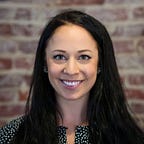My Universal Design Doctoral Experience
Initial Encounter
My initial encounter with the concept of universal design was during a guest lecture in the first year of my occupational therapy curriculum. Prior to the Pruetts graciously sharing their expertise and personal connection to universal design, I had little to no knowledge of the broad spectrum topic. Their story captivated my attention as I eagerly sat absorbing the implications this “new” concept had for occupational therapy practice. As I listened, I wondered, “How could a concept with such considerable potential to enhance the lives of everyone be so sparsely integrated into the current design process, let alone OT practice?” Not only did the concept just make sense from a functional standpoint, it also had implications to increase participation in homes and the community for people of all ages and abilities across the lifespan, thus, optimizing quality of life. It seemed like a no brainer.
After the guest lecture, my head began buzzing with questions, ideas, and excitement about this “novel” concept. The concept of universal design is completely relevant and applicable to the field of occupational therapy, in terms of how an environment can either hinder or support optimal participation in meaningful activities. I remember reaching out to an individual with whom I was acquainted, who had quite a bit of experience in the private building sector and shared my excitement about what I had learned through the Pruett’s lecture. To my dismay, the individual rejected the concept in its entirety. The prickly reaction to this conversation immediately threw up a red flag: If I was speaking about how design can be used to support the safety and functionality of so many individuals, why would a potential design stakeholder be so reluctant to hear my thoughts? Was this a common attitude?
Research Focus
When it came time to declare a topic for the culminating project of my 16-week doctoral experience, I decided to further pursue my interest in the concept of universal design and how it applies to the built environment. After a painstaking literature review, it was evident that confusion prevailed over the general concept of UD, as well as serve as a barrier to collaboration amongst the various stakeholders involved with home or community design.
The intent of my research is to unveil the attitudes and perceptions of various stakeholders regarding the use of universal design in the built environment. Having a more comprehensive understanding of these perceptions may advance the foundation on which to build in order to materialize this concept into mainstream building and community design. Universal design can serve as a platform to support community participation and engagement as well as support the Productive Aging and Rehabilitation, Disability, and Participation emerging niche areas of occupational therapy practice, which further warrants the need for the undertaking of my study.
Semi-structured interviews were chosen to collect data from home health occupational therapists licensed in the state of Virginia, design stakeholders (i.e. architects, developers, contractors, interior designers, etc.), and consumers who have had home modifications within the last decade.
It is my sincere hope that the results of the study lend advocacy support to the integration of an occupational therapist’s unique skill set into the process of universal design, as well as better define how collaboration amongst stakeholders can be established.
Doctoral Experience
In addition to managing my specific project, I am working in collaboration with the Pruetts at The Universal Design Project, assisting them with their organization’s projects and research in order support their mission. This collaboration has heightened my research abilities, enabled me to develop new professional networks, cultivated new “technological” abilities through various project requirements, and has helped expose me to various community organizations whose missions support inclusion in communities and people with disabilities.
The experience thus far has fostered and enhanced my professional skills and abilities in order to acquire advanced knowledge in research, advocacy, and administration in the occupational therapy profession. Ultimately, these skills will help support the advancement of the profession.
I am eager to share more as the semester advances!
